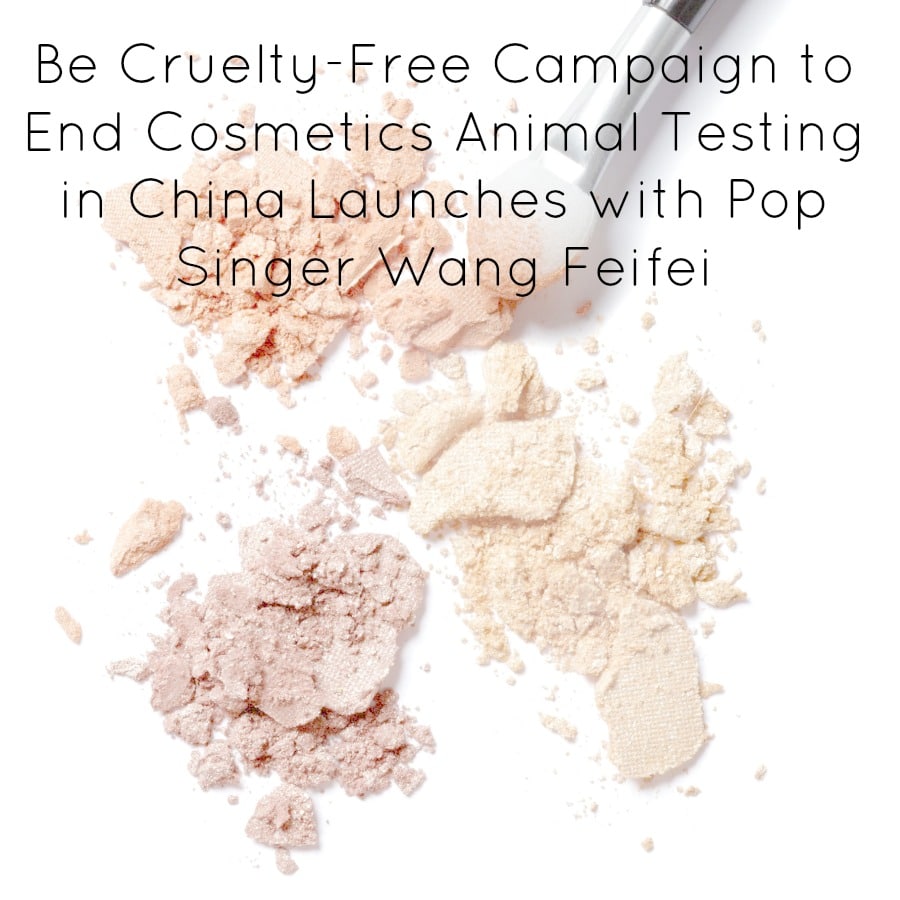Be Cruelty-Free Campaign to End Cosmetics Animal Testing in China Launches with Pop Singer Wang Feifei

The animal testing policies in China are one of the most controversial. Currently, all cosmetics sold in China are required to be tested on animals. Many brands that would otherwise be cruelty free submit to these tests in order to have access to the Chinese consumers. In a recent press release from Humane Society International, they provided a lot of great details about the Be Cruelty-Free campaign they are launching in China.
BEIJING (July 1, 2013) — Be Cruelty-Free, the world’s largest campaign to end animal testing for cosmetics globally, has launched in China to promote beauty without animal suffering. Humane Society International, Chinese NGOs and academic scientists, global retailer LUSH Cosmetics and Chinese pop singer Wang Feifei, are calling for China to end its mandatory testing of cosmetics on live animals. Be Cruelty-Free is already driving policy change across India, South Korea, Oceania, Brazil, Russia, Canada and beyond.
China is the world’s fourth largest beauty market, worth an estimated $22 billion globally, and also one of few countries where cosmetics animal testing is still legally required. Beauty brands including LUSH and Urban Decay decline to sell in mainland China until the animal test requirements are removed, but most other market-leading cosmetics companies do sell in China, meaning they submit to animal testing.
Be Cruelty-Free’s aspirations were given a boost this month when European Union Commissioner Tonio Borg discussed animal testing with Chinese regulatory authorities, encouraging them in a subsequent statement “to avoid unnecessary testing for cosmetics,” and adding that in certain cases “the respect of animals as well as the costs of animal tests speak in favour of not doing them.”
Worldwide, hundreds of cosmetics companies avoid new animal testing by using safe, existing ingredients and available non-animal tests. However, most internationally recognized non-animal tests have not yet been officially accepted by Chinese regulators, although this is beginning to change. HSI is doing its part to support accelerated uptake of alternative testing methods by China through the launch of an $80,000 partnership with the Institute for In Vitro Sciences to provide Chinese scientists with hands-on training using advanced non-animal methods.
Troy Seidle, HSI’s director of research & toxicology, said: “Humane Society International is working around the globe to help countries to Be Cruelty-Free, but it is here in China that we see such enormous potential to end animal testing within the cosmetics industry. China is the key to change, and we’re looking forward to working with Chinese regulators, companies and scientists to see animal tests phased out. Our partnership with Institute for In Vitro Sciences marks the beginning of an exciting new age in China as it embraces international best practices and begins to lead the way in transforming cosmetics safety testing without animal suffering.”
The grant to IIVS is provided jointly by HSI, The Humane Society of the United States and the Human Toxicology Project Consortium, and will provide Chinese regulators and experts with the necessary confidence in the latest technologically advanced non-animal approaches to facilitate a move away from animal testing when reviewing cosmetics safety submissions.
Singer Wang Feifei welcomed the launch of Be Cruelty-Free China. Feifei said: “Most people do not realise that so many animals suffer for the beauty of us humans. I am so happy to support Be Cruelty-Free China and to know that there are modern scientific alternatives that can replace outdated animal testing. Chinese consumers should not be prevented from purchasing cosmetics that are not tested on animals, and I have every reason to believe that, with the help of the Be Cruelty-Free campaign, cosmetics animal testing shall be ended in China.”
HSI will be working with a coalition of Chinese NGOs across the country to increase consumer awareness about cosmetics animal testing.
Qin Xiaona, director of CAWA, said: “Beauty products made or sold in China come at a huge and totally unnecessary cost to thousands of animals. While the rest of the world is turning away from animal testing, our regulations are holding us back from leading the way in cruelty-free cosmetics. It’s time for our country to take the important step of phasing out animal testing, and by launching the Be Cruelty-Free China campaign with Humane Society International, we’re urging Chinese people to support the government in making positive change for animals, consumers, companies, science and safety.”
Since Europe’s sales ban on newly animal-tested cosmetics came into force in March this year, it is illegal for international and Chinese brands to sell any newly animal-tested cosmetic products in the European Union, still the largest beauty market in the world.
Global cruelty-free cosmetics retailer LUSH Handmade Cosmetics does not currently operate in mainland China because it refuses to compromise its strict “no animal testing” policy. LUSH urged the authorities to remove animal testing requirements.
LUSH Ethics Director Hilary Jones said: “LUSH produces a diverse range of cosmetic products — shampoos, soaps, perfumes, moisturisers — but we have never and will never test on animals. Whenever we open up in a new world market, consumers greet our products with enthusiasm, so it is a great shame that at the moment LUSH is unable to bring gorgeous, safe and cruelty-free beauty products to China. The Be Cruelty-Free campaign is achieving great change in many countries, so we are excited to be here for its launch in China and we look forward to the day when Chinese consumers can have access to cosmetics products that are not tested on animals. Most importantly, ending animal testing requirements will also open up foreign markets to Chinese cosmetics products.”
Chinese consumers can go online to sign the Be Cruelty-Free pledge to show their support for a China without cosmetics animal testing.